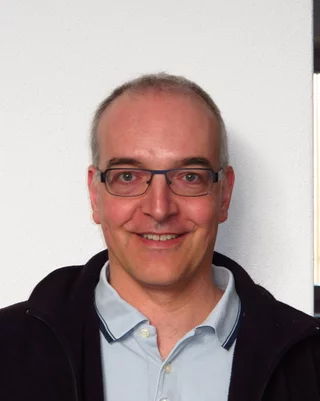Biography
Bernd Schmitt studied physics at the University of Heidelberg with a diploma thesis on the silicon drift detector of the NA45 experiment at CERN and received his PhD from the University of Bonn on a precision measurement of the Z0-line shape with the Opal experiment at CERN. After the PhD he obtained a PPE fellowship at CERN and worked on a the microstrip detector system for the CMS experiment at LHC and LEPII data analysis. After a subsequent position at Philips Semiconductors he joined PSI in 1999 as a staff scientist where he was responsible for the development of the Mythen microstrip detector for time resolved powder diffraction. Since 2008 he is the group leader of the detector group of the Photon Science Division. He is member of several advisory boards and review panels and holds several patents.
Institutional Responsibilities
Bernd Schmitt is responsible for the Detector Group of the Photon Science Division at PSI. The responsibilities include the development of a longterm detector strategy and detector portfolio for SLS and SwissFEL, management of the people and the budget of the group. The group has about 20 members consisting of technicians, engineers, PhD students, postdocs and scientist. He often is a member of the selection panels for positions at PSI and a member of PSI internal steering groups.
Scientific Research
His main scientific interest is in sensor research for low and high energies and the development of new detector concepts to overcome the limitations of current detectors. He is involved in beamtimes and characterisation measurements. His special interest is the utilization of charge sharing in the sensor to increase the position resolution of detectors.
Publications
For an extensive overview we kindly refer you to our publication repository Dora or researchid
-
Allahgholi A, Becker J, Delfs A, Dinapoli R, Goettlicher P, Greiffenberg D, et al.
The adaptive gain integrating pixel detector at the European XFEL
Journal of Synchrotron Radiation. 2019; 26(1): 74-82. https://doi.org/10.1107/S1600577518016077
DORA PSI -
Bergamaschi A, Andrä M, Barten R, Borca C, Brückner M, Chiriotti S, et al.
The MÖNCH detector for soft X-ray, high-resolution, and energy resolved applications
Synchrotron Radiation News. 2018; 31(6): 11-15. https://doi.org/10.1080/08940886.2018.1528428
DORA PSI -
Leonarski F, Redford S, Mozzanica A, Lopez-Cuenca C, Panepucci E, Nass K, et al.
Fast and accurate data collection for macromolecular crystallography using the JUNGFRAU detector
Nature Methods. 2018; 15(10): 799-804. https://doi.org/10.1038/s41592-018-0143-7
DORA PSI -
Wiedorn MO, Oberthür D, Bean R, Schubert R, Werner N, Abbey B, et al.
Megahertz serial crystallography
Nature Communications. 2018; 9(1): 4025 (11 pp.). https://doi.org/10.1038/s41467-018-06156-7
DORA PSI -
Jungmann-Smith JH, Bergamaschi A, Brückner M, Cartier S, Dinapoli R, Greiffenberg D, et al.
Towards hybrid pixel detectors for energy-dispersive or soft X-ray photon science
Journal of Synchrotron Radiation. 2016; 23(2): 385-394. https://doi.org/10.1107/S1600577515023541
DORA PSI


